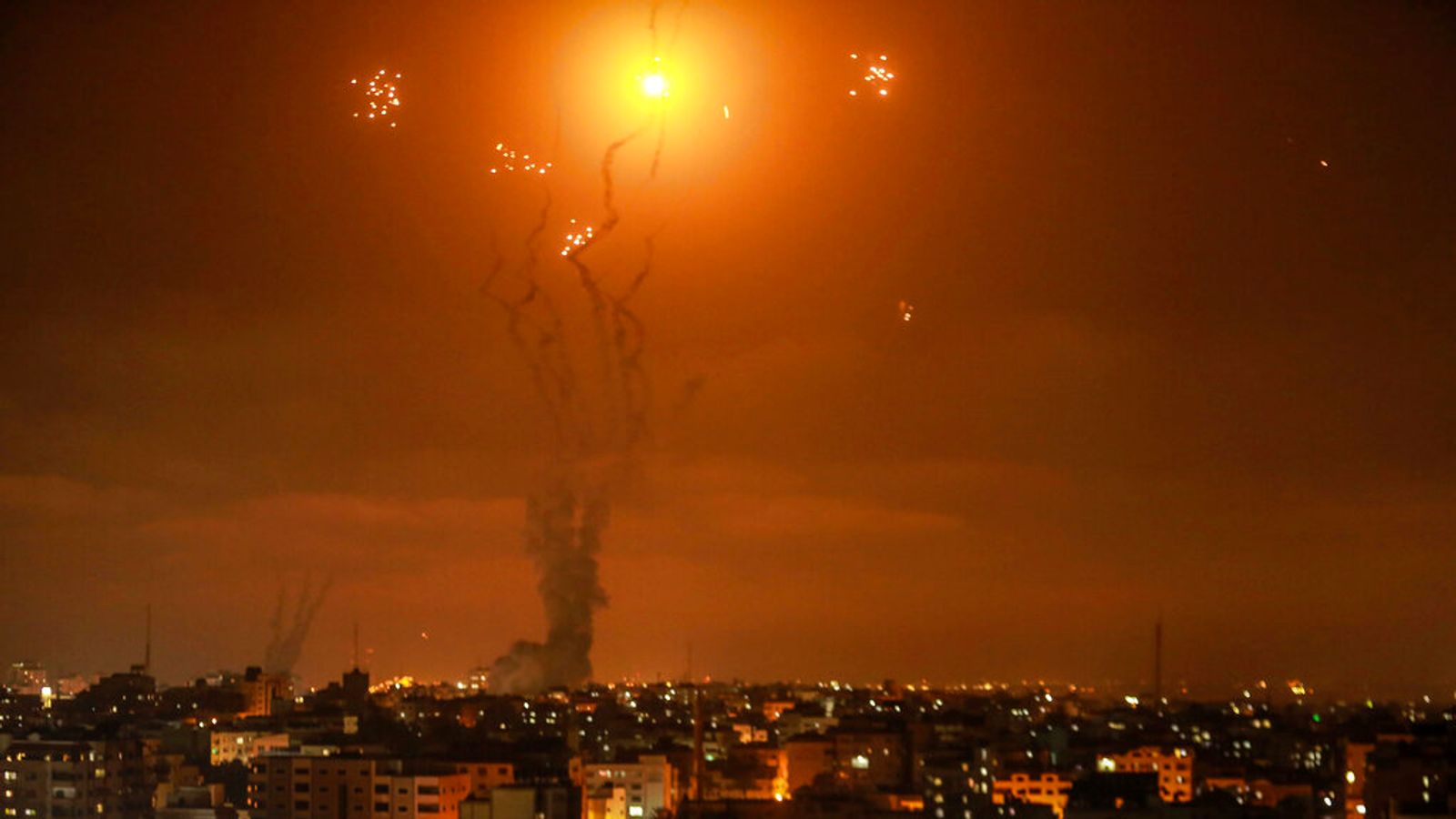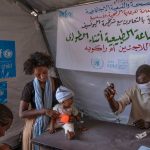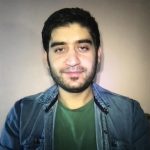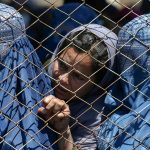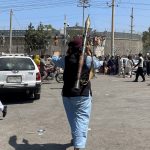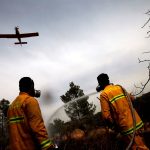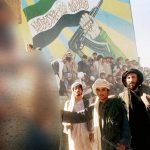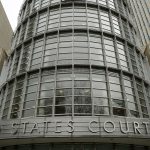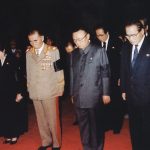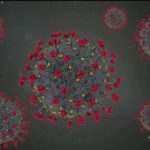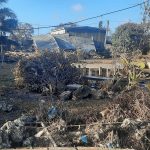Hamas militants have announced one of their most senior leaders in Gaza has been killed in an airstrike amid the worst violence in the region since 2014.
Gaza City commander Bassem Issa is the highest-ranking Hamas figure to be killed since the war there seven years ago.
Israeli security services said he is one of 16 key Hamas members to die in the fighting that began on Monday.
Hundreds of missiles have been fired from both sides – one of the latest on Wednesday resulting in the collapse of 13-storey office block in Gaza City.
Israeli forces say they fired a series of warning shots an hour before the strike on the tower block, which they claim had Hamas intelligence officials inside, to allow civilians to escape.
It came after hundreds of rockets were fired from Gaza towards Tel Aviv and its suburbs on Tuesday.
In Lod, around 10 miles (16km) from the city, a state of emergency was declared on Wednesday morning amid clashes between Israeli Arabs and Israeli Jews.
Towns and cities across the region where both communities live side-by-side have become violent in recent weeks in a culmination of months of tension.
Please use Chrome browser for a more accessible video player
So far the violence, which the UN says risks “escalating towards a full-scale war”, has killed at least 65 people in Gaza.
According to the Palestinian Ministry of Health, the Palestinian death toll includes 16 children, plus another six within Israel, and five women. A further 365 have been wounded.
Five civilians have been confirmed dead in Israel and more than 200 have been injured.
Russian media has reported a Hamas official saying it is willing to halt fighting on a mutual basis.
But Israeli Defense Forces (IDF) Lieutenant Colonel Jonathan Conricus has told Sky News that the missile fire is set to continue for now.
The fast-escalating violence is being condemned by the international community, with US secretary of state Antony Blinken vowing to send his most senior envoy to the region as soon as possible.
UN Security Council officials were due to meet in New York to discuss the situation today.
What Israeli Defense Forces and Hamas have to say:
Spokesman Lieutenant Colonel Jonathan Conricus told Sky News a rocket unit of the Palestinian Islamic Jihad group has been hit; a commander of an anti-tank missile unit of Hamas killed, alongside senior operatives from the Hamas military intelligence department, the commander of its Gaza City Brigade and Khan Yunis Brigade.
The Israeli military claims that of the around 1,000 Hamas rockets fired from Gaza, 850 landed in Israel or were intercepted but 200 did not make it across the border and landed in Gaza.
Hamas commanders have not responded to the allegations that some of its own rockets may have misfired and caused Palestinian deaths.
They instead talked of “the honourable scene” of bombarding the city of Tel Aviv – their specific target along with its international airport – describing it as “the biggest achievement in this battle”.
Its spokesperson Fawzi Barhoum said: “While the Israeli occupation has decided to launch a new war against Gaza, the Palestinian resistance led by al Qassqm Brigades is determined to act in response and has the right to defend the Palestinian people.
“Today, we declared that the resistance will act in self-defence against any Israeli violation, crime or atrocity.
“We deem the bombing of Tel Aviv as the biggest achievement in this battle.”
In a spiral of violence which is escalating fast there are developments on several fronts with:
• 56 dead in Gaza including 14 children and six dead in Israel. At least 335 have been wounded
• The collapse of a multiple tower blocks in Gaza
• Five civilians dead in Israel and more than 200 wounded
• An Israeli soldier was killed in rocket attack, according to the Israeli army
What is happening elsewhere?
As well as airstrikes, in another alarming development, rioting and civil unrest has broken out overnight in several “mixed” Israeli cities.
These are cities within Israel (rather than the West Bank) where Israeli Jews live alongside Israeli Arabs.
In a number of towns including Acre, Nazareth and Lod, Israeli Arabs protested in support of Palestinians who are considered under international law to be occupied by Israel.
Please use Chrome browser for a more accessible video player
The unrest, which prompted a state of emergency to be declared in Lod to the east of Tel Aviv, represents a new schism and a challenge for the Israeli government to contain.
For Hamas, it plays into the casting of themselves as the protectors of the Palestinians.
Hamas spokesman Mr Barhoum said: “The Palestinians’ in-street celebrations of bombing Tel Aviv across Palestine is a clear declaration of victory and indicates their awareness of successful resistance operations in response to Israeli atrocities.”
The international response:
The heaviest fighting between the two enemies since 2014 has caused global alarm with the US, the EU and the UK all calling for restraint by Israel, while at the same time, saying it has the right to defend itself.
All are demanding that Hamas immediately stop its rocket attacks.
Prime Minister Boris Johnson said on Wednesday that the UK was “deeply concerned by the growing violence and
civilian casualties” and he urged an “urgent de-escalation of tensions”.
US Secretary of State Antony Blinken has said that both sides must cease violence immediately and is sending his most senior official to the region as soon as he can.
But behind the international rhetoric, there is no effective diplomatic strategy to stop the cycle.
And with Israel and the Palestinian West Bank both in disarray, any contact between the two sides has broken down.
How the situation re-ignited:
The violence began last weekend at the al Aqsa mosque, the third-holiest site in Islam and the holiest site in Judaism.
In a highly provocative move Israeli police entered the mosque and threw stun grenades inside.
Palestinians were also angry at an Israeli police decision, at the start of Ramadan, to barricade the seating area outside Jerusalem’s Damascus Gate.
Please use Chrome browser for a more accessible video player
That violence followed many months of ever-increasing frustration by Palestinians, with Jewish settlers expanding at unprecedented levels into the occupied West Bank and East Jerusalem.
There is also the issue of Sheikh Jarrah, the East Jerusalem neighbourhood where Palestinian families are fighting a court battle with Jewish settlers who want to take their homes, claiming the land is historically theirs.
And last month, Human Rights Watch released a major report accusing Israel of a process of apartheid over the Palestinians.
Israel captured East Jerusalem in 1967 and annexed it as their own, but most of the international community considers it to be occupied land.
In a culmination of all recent events, on Monday evening Hamas began firing rockets from Gaza towards Jerusalem and the conflict escalated rapidly.
